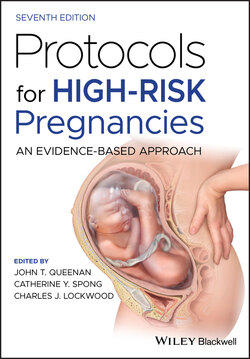Читать книгу Protocols for High-Risk Pregnancies - Группа авторов - Страница 149
Introduction
ОглавлениеFetal and neonatal alloimmune thrombocytopenia (FNAIT) is a maternal alloimmune condition in which specific maternal antibodies target paternally derived human platelet antigen (HPA) expressed on fetal platelets, resulting in potentially severe fetal and neonatal thrombocytopenia. Disease incidence has been estimated as 1 out of every 1000 live births, varying by ethnicity.
Fetal and neonatal alloimmune thrombocytopenia requires that a phenotypic incompatibility exists between the biological mother and father for a disease‐causing HPA antigen, and that the fetus inherits a paternally derived antigen that the mother does not possess, resulting in sensitization. The most common antigen implicated in disease is the HPA‐1a antigen, which is responsible for about 80% of confirmed cases. Common antigens implicated in FNAIT pathogenesis include HPA 1, 2, 3, 5, and 15 systems, and these together are believed to account for over 95% of cases.
